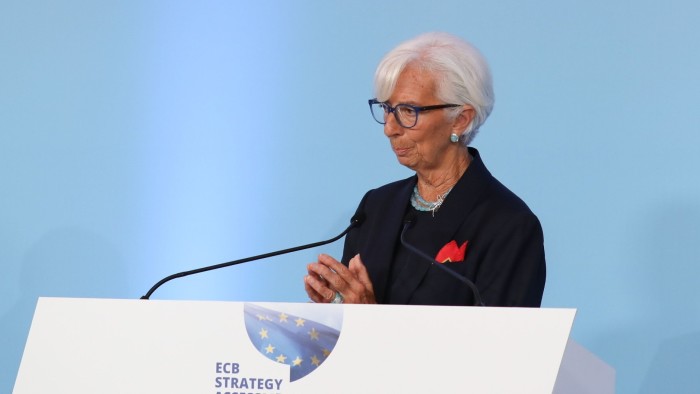[ad_1]
Unlock the Editor’s Digest for free
Roula Khalaf, Editor of the FT, selects her favourite stories in this weekly newsletter.
Just weeks after European Central Bank president Christine Lagarde hailed a “global euro” moment and said the common currency could rival the dollar, some inside the central bank are wondering if the euro’s strength could become too much of a good thing.
The euro has soared 14 per cent against the dollar in 2025 to reach its highest level in nearly four years as investors pile into European assets to shelter from US policy volatility, upsetting predictions it would hit parity with the greenback this year.
The rise came despite a mounting divergence in interest rates between the US and the much lower rates in Europe, an upending of the usual market dynamics.
At the ECB’s three-day annual conference in Sintra, Portugal, its vice-president Luis de Guindos was most outspoken, telling Bloomberg TV on Tuesday that “we should try to avoid any sort of overshooting”.
While the ECB could look past the current exchange rate of around $1.18, levels beyond $1.20 “would be much more complicated”, he said.
A stronger currency makes imports cheaper and drags down inflation, while sales abroad become more expensive and weigh on growth, particularly for export-dependent Europe. With the Eurozone already threatened by a trade war with the US, some central bankers are uneasy.
One senior European central banker, speaking on the condition of anonymity, said the ECB might need to signal more strongly that it does not like an overly strong euro, as it increases the risk of inflation undershooting targets. A second senior official said the strong euro could “become an issue”.
Tomasz Wieladek, chief European economist for fixed income at T Rowe Price, said ‘‘policymakers likely expected a slow euro appreciation over time . . . but this is not what is happening in practice”.
The rise has been “too fast for comfort”, Wieladek said, adding that it was “likely because private sector portfolios are also pivoting to Europe and at much larger speed than anticipated”.
If the euro appreciates further to hit $1.25 this year — a rise of 6 per cent from the current level — the ECB could cut rates by half a percentage point to mitigate the effects on inflation and the economy, he said.
Recommended
While the ECB has halved borrowing costs to 2 per cent since June 2024, the Fed has kept them higher at more than twice that rate. Historically, higher US yields attracted capital inflows into the US, strengthening the dollar.
The stronger euro has helped to make life easier for the ECB as it reduced fears that a potential trade war with the US could drive up inflation in the currency bloc.
Investors were seeking alternatives to the dollar, as this year’s news flow could translate “into a general lack of confidence that will be further fuelled by more uncertainty”, Lagarde said in Sintra. “There is clearly something that has been broken,” she said about the dollar’s weaknesses, adding that it was unclear if “it is fixable”.
Recommended
Lagarde did not address the implications for ECB policy, but stressed: “We take it into account for purposes of our projections.”
As inflation hit the ECB’s medium-term 2 per cent target in June, and is projected to temporarily fall to 1.6 per cent next year, there is increasing unease among Europe’s top central bankers — especially if the stronger euro coincides with higher US tariffs.
“A stronger euro would weigh on exports and so can be disinflationary,” said Pooja Kumra, a rates strategist at TD Securities. “The euro area at this stage really doesn’t want to enter the deflation era seen in the 2010s.”
The challenge for the ECB is that any attempts to tamper with the exchange rate could easily backfire.
“There is a long-standing etiquette among global central banks that unilateral action on the exchange rate is off-limits,” one influential policymaker told the Financial Times.
Uncoordinated attempts to tamper with currency markets are either doomed to fail or could even trigger a currency war, they said, adding that the situation was further complicated by some Trump allies arguing in favour of a weaker dollar.
Some investors are sanguine. Mike Riddell, a fund manager at Fidelity International, pointed to the EU’s large trade surplus, which is typically an indication that a country’s currency should appreciate.
“I don’t think policymakers have a leg to stand on when complaining about the euro being strong,” he added.
Boris Vujčić, governor of the Croatian central bank and one of the 26 members of the ECB’s governing council, was similarly unfazed.
The euro is at the same level as when it was introduced and has traded more strongly in many of the past 25 years, he told the FT. “Current levels are far from being exceptional.”
[ad_2]
Source link




